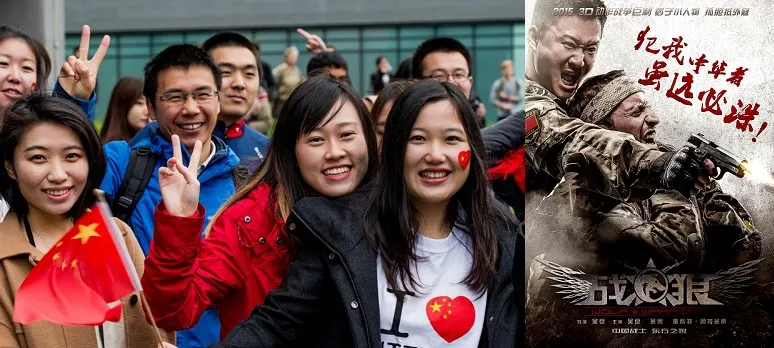
The Horse Isn't Dead Enough! (WHAM WHAM!)
Ethnocentrism \ ETH-nō-SEN-tri-zəm (noun): the attitude that one's own group, ethnicity, or nationality is superior to others; etymology: from "ethnos," meaning "race" or "tribe," "center," meaning exactly what it says, with the suffix "ism" that denotes a philosophy or way of thinking.
中华 \ Zhōng-huá (noun): literally, "flower of the center;" Mandarin word for people of Chinese origin. construction: 中 (zhong) = "center" or "middle," and 华 (hua) meaning "flower" when it stands alone, with other connotations when used in conjunction with other characters. (1)
中国 \ Zhōng-guó (noun): literally, "central nation(2);" Mandarin word for China
I really don't think that the inherent ethnocentric arrogance that underpins the entire sociopolitical structure (and indeed the entire cultural identity) of the self-styled "Central Nation" is a new topic at this point. The belief, indeed the near-religious assuredness of their own supremacy in all things has been cornerstone and capstone alike of the closest thing to a "national identity" China has ever had, even as far back as the proto-Chinese Zhou Dynasty. Steven W. Mosher devoted an entire section of Bully of Asia to this concept, with the most salient points found in a subsection whose Kipling-callback title, "Yellow Man's Burden," drives the point home perfectly (196 - 207). Of the sinologists I frequently cite in this blog, nearly all have pointed out this side of China's culture more than once.
Fenby
The rulers of the Middle Kingdom have always spun narratives of uniqueness and power to impress their own people and establish their nation's superiority for foreigners. They have sought to assume sweeping, supra-human dimensions as they guide a land which they class not as a country like others, but one whose destinies are protected by the Mandate of Heaven. (page 7)
The overriding mindset this century has been that everything will turn out right because it has always done so, because the Communist Party knows what it is doing and because this is China, a special place with a special destiny. (page 27)
McMahon
In short, the broad acceptance of Chinese exceptionalism as fact is the source of much of China's power. (page xvi)
Midler
Chinese consider themselves the creme de la creme of civilizations, and they are convinced not only of their greater intellectual activity, but also of their superior practices and methods. (page 78)
China considers itself to be so special that even the most fundamental laws of nature do not necessarily apply to it. (page 85)
And of course these last two come from an entire chapter entitled "Sinocentric Thinking (pages 76 - 85)," which contains some of the most hilarious examples, including an account of a conversation wherein a Chinese metallurgist insisted his materials could not be found on the periodic table because it was a foreign chart and Chinese metallurgy was unique (page 82).
Even Ben Chu, something of a China-apologist (for perhaps evident reasons) who attempts to soften the blow of China's inherently racist mindset, cannot escape the admission that "Chinese people's ethnic and biological cohesiveness has bred a streak of ugly chauvinism in the national character (page 53)" and "the old term 'foreign devil'... slips thoughtlessly from the lips of even the most ostensibly enlightened and polite of Chinese (page 68)."
The internet as well has been rife with examples. Foreign Policy (Kotkin) and The Diplomat (Kazianis) warned at the beginning of this decade of the "rise" of Chinese jingoism (mistakenly believing this was a new trend). Around the middle of the 2010's, traces of this sense of superiority began to manifest themselves in China's foreign policy. Dr. Christopher Ford's comments were perhaps the most chilling, given that they were delivered casually by generals in an insecure fighting force called the PLA, which is quite aware that they have something to prove). Even in diplomatic settings, China has apparently found it difficult to grasp the notion that parading around with the delusion that you are above all your neighbors and rules do not apply to you, is (gasp) apparently considered offensive (Lowsen; Burney & Hampson). There was a minority who clung to the rather naive belief that this jingoistic tendency was a rogue wave in China's pop culture and that the authorities were actually trying to rein it in (li). I can only presume these few overlooked the fact that Wolf Warrior 2 was CPC-funded, with a script specifically shaped by the CPC's Cultural Affairs Committee to send exactly the message it sent (Raleigh).
Indeed, the sense that the "Central Nation" is superior to all other nations has never been far beneath the surface of the Chinese psyche, and the crisis of 2008, which gave much of the world the mistaken impression that the West was in terminal decline and it was now China's turn to rule brought it bubbling so near the surface that it occasionally became impossible to hide it.
Well, let it be known that they are not even trying to hide it anymore. This year is 2019, the 70th anniversary of the founding of the PRC. For the Chinese, who are superstitious by nature (and for whom 70 is a highly is a highly symbolic and significant number), this means that the mask is now off. The "Central Nation" now feels quite comfortable telling the whole world "of course we're superior. How can you not see that?"
Social Media
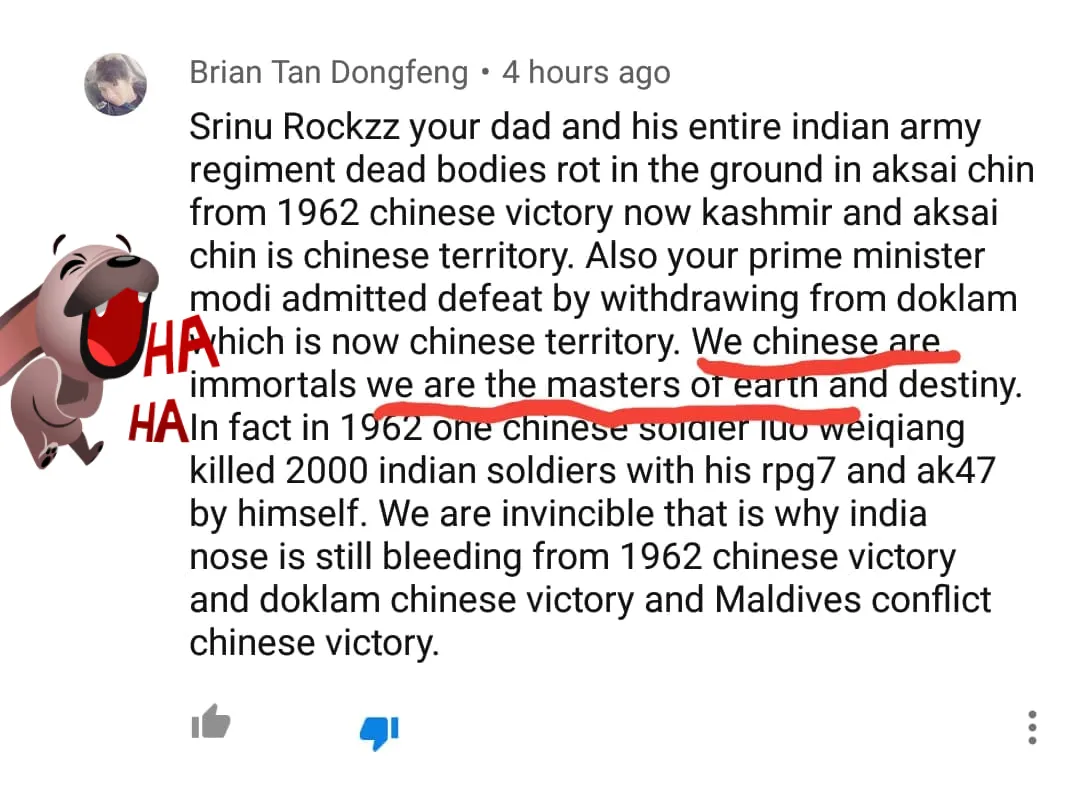
Social Media is not a new battlefield for China's propaganda warriors. If there is anyone reading this who is not already familiar with the "Fifty Cent Party," then take a moment and get familiar with them before reading on (Waddell; Farrell; China Digital Space). However, in the past, their tactic has been to attempt to portray China as the savior of the world against the "Eeeeeeeeevil West," and for their more elite specimens, trying to trick commentators critical of China into a comment that could be construed as racist. Another favored tactic was to change the subject away from any debate considered "sensitive" by the Chinese regime and put the ones who are critical of China on the defensive, too busy justifying themselves to continue criticizing China.
At least, that was before.
Now, after the 70th anniversary parade (which I, like all foreigners with any sense, chose to roll my eyes and get out of the country for), China's internet trolls have taken to the web to broadcast their unabashed belief that they are the world's "new rulers," in no uncertain terms. One of the best examples I've ever seen was in the comment thread on a post on Nikkei Asian Review's Facebook page, by a pair named Darius Chin and Anthony Fang. Their comments are a hilarious hodgepodge of every negative stereotype one could imagine about the Chinese, from accusing everyone in sight of racism while slinging racial slurs and accusing the West of "Imperialism" while bragging of their country's imperialist past (and present), to speculative schoolyard taunts that sound like something Ah-Q would have come up with, and of course, no Chinese tirade would be complete without some classic alternative history with Chinese characteristics. Chin was especially funny to watch as he launched four consecutive posts blasting the same opponent (who must clearly have struck a nerve to get him that wound up). I realize the proper procedure here is to cite each comment in the "Works Cited" section but citing the Original Post itself will have to suffice here as Steemit has a character limit (and besides, I've screen-capped them for viewing here).

...
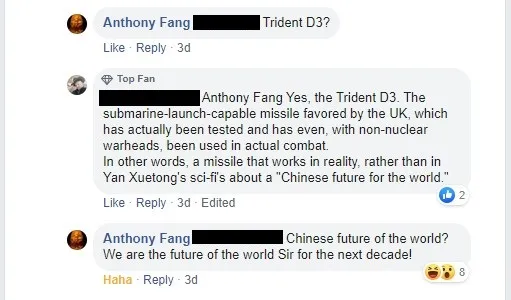
...
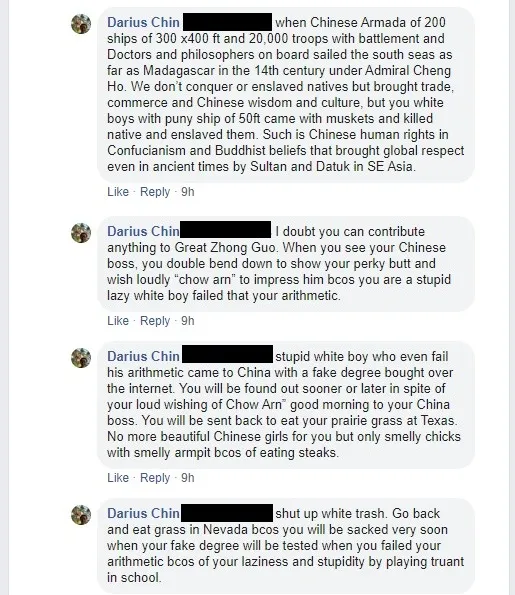
The rebuttal to this one, wherein the "stupid white boy" Chin is slinging crap at like a monkey on a cage absolutely shredded Chin's myth about the "benevolent Zheng He," was glorious to behold. Of course, Fang and Chin went on, and this was one of my personal favorites because I've debunked it in a previous article...
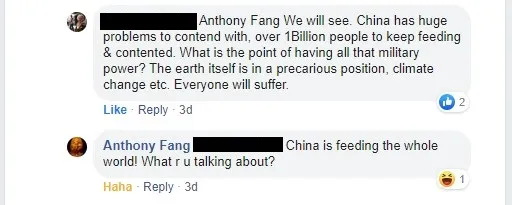
But anyway, that can be shrugged off, right. I mean, a few Kommunist Keyboard Kommandos don't indicate an upshift in China's entire attitude, right? Well...
Academic Circles As Well
When I read the next article I will discuss, I had to check the date multiple times to see if it was an April Fools prank. There is actually an organization in China, funded by the CPC, made of men and women who are alleged to be "scholars," holding positions as Professors at prestigious universities within China (eh, "prestigious" being a relative term of course, as no university in China is really respected worldwide, for reasons that may soon become apparent), who are actually trying to claim that they have "discovered," after 20 years of CPC-funded research, that all Human civilization originated in China, emigrating from China some time in the 1500's, and that all non-Chinese history anywhere in the world prior to that time was written ex-posto facto by Europeans to hide the shame of having no history or culture of their own.
If I hadn't read it from multiple sources (General; Zin), I wouldn't have believed it. Ladies and Gentlemen, let me introduce you to China's World Civilization Research Association (世界文明研究促进会).
He stated that unlike China, there was no history in Europe before the 15th century. Using Chinese history as a basis, the Europeans “fabricated” stories about ancient Egyptian, Greek and Roman civilizations to cover such a “historical humiliation.”
To spread the word of this “fake world history” and “restore” its truth, the World Civilization Research Association has set up offices in the U.S., Canada, U.K., Thailand, South Korea and Madagascar.
“Do not let fake, Western-centered history hinder the great Sino-Renaissance (3),” founder Du Gangjian (杜钢建) was quoted as saying.
You can't make this up, folks.
Now, to be fair, this one is so far in Left Field that not even most of the Chinese are taking it seriously and the article goes on to point out that some of the sharpest mockery of these idiots came from China's incredibly small educated minority. But the fact that this report was allowed to be published at all is very telling. I remind the reader, this is China. There is no free press, there is no freedom of academic discourse, there is no freedom of speech. If it's in print, the Party wants it in print. If it's said in public and not immediately censored at gunpoint, the Party wants it to be said. Period.
These "scholars" are Party members, working as government-appointed educators, at government-run universities, conducting research reported regularly to the government, with government funding, and none of that funding was lost, nor were any of the "scholars" removed from their posts after the presentation. In the West we would say "well good. Freedom of speech was upheld." Again though, Freedom of speech has never existed here. The evidence is pretty conclusive that the CPC approves of this message.
But the place I was the most surprised to see this rampant Jingoism appear (at least without its usual mask) was in my own damned classroom.
Patriotism Before Critical Thinking
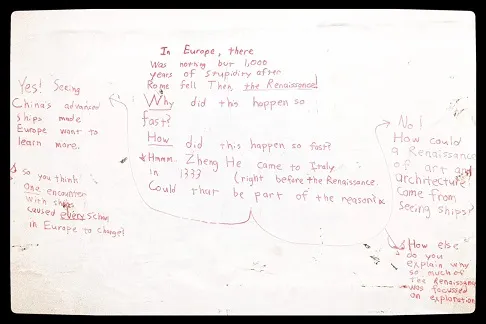
In one of my after-school classes, I teach a group of six students between 10 and 12 years old. The material is reading comprehension and critical thinking, and I have a game I use at the end of class called "Oh Really?!" The premise is that I give the students an opinion-based question which they must answer (in English), with the understanding that no matter what opinion they put forth, I will argue against it and they have to explain why they're right. The questions are usually either/or, with one of the obvious objections to each argument already written on the board as a hint.
Well, one of the classes featured a reading passage about the Renaissance in Europe, and the "Oh Really?!" question had to do with whether or not Zheng He's voyage (which may or may not have reached Italy, depending on which sources you believe) had something to do with it.
Naturally, the students all insisted "yes, it must have been the awe-inspiring sight of Glorious China's magnificent vessels that caused the poor, lowly and ignorant Europeans to aspire to greater things," albeit not that eloquently (they're pre-teens, and English is their second language). I didn't really think too much about that other than a quiet chuckle, if truth be known. The lesson was delivered less than a week before their big National Anniversary on October 1, so I'm not going to try and blast a few kids for waving the flag when they've had it waved in their faces so much at school. I'd imagine US students would have given America credit for everything from the Pyramids to the Magna Carta if you asked them about it in early July of 1976, or the post 9/11 Patriotic Fervor.
The WeChat post by one of the parents (who is also the TA in the class) was a bit more eyebrow-raising.
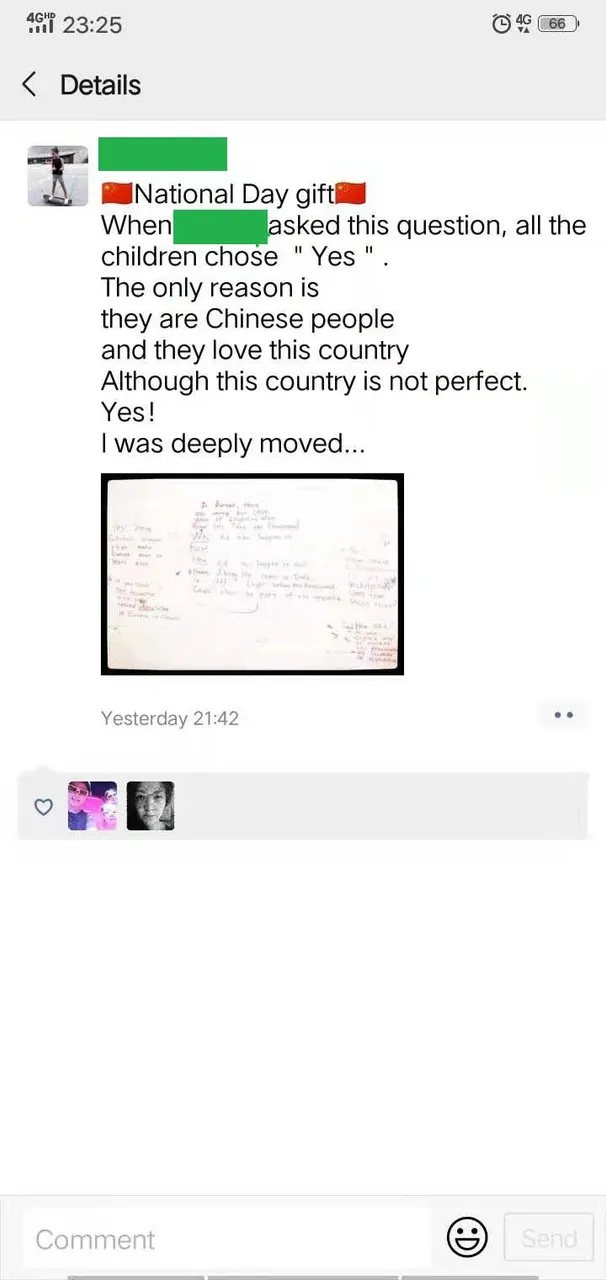
...Uh, so this lady is aware that the reason had nothing to do with critical thinking, and that it was merely a reflexive "any answer that makes China look good must be right" reaction.
...And she was "deeply moved" by this.
For the record, the two "likes" at the bottom were the owner of the training center (whose daughter is also in the class), and its secondary investor (whose son used to be in the class before he started taking up sports practice instead).
I could see giggling a little at it, but the phrasing here makes plain that this mentality of "never question any view that makes China look good" is something they aspire to, and want their children to aspire to.
Two and a half weeks later I was at the same center, delivering a different lesson to a class that contained 2 of the same students. The lesson this time was about Marco Polo's voyage (the class was National Geographic's Reading Explorer Level 1, for the record), and the passage mentioned that the Chinese emperor employed the Polo family during their 17 years in China to make use of their unique skills, such as cartography and architecture, fields in which China lagged far behind Europe at the time (by Kublai Khan's own admission).
Of course, the center owner's daughter (who, by the way, has usually been one of the most insightful in the class) stopped to raise her hand, brow furrowed in confusion, and ask "but [Patriam], that's wrong. China has always been ahead of Europe... In everything!" It took fifteen minutes to calm the flurry of frantic insistences that she was right, all of which were shouted in Mandarin at the TA. The TA's response was to remind the students that the book was a "Western textbook, filled with many primitive ideas and false history."
Insert eyeroll here.
Finally, the lesson drew to a close with another "Oh Really?!" activity, which required me to draw a world map on the board. Now I'm no cartographer, and if the relevant parts of a map I draw (that is only going to be erased at the end of class) are identifiable, I consider the map good enough. But apparently, my world map committed the cardinal sin of not having China at the middle. Aside from that, apparently I made China too small.
OH, HORROR OF HORRORS, right?
So, after a five minute break, I came back to find that the same girl had taken a red marker and colored in every single continental space on the map in red, except for Japan. She grinned at me, waved her hand over the map, and said "all of this in red, is China." Then she pointed to the one non-Red space (Japan) and said "and this is all the other countries, including America."
Again, given the amount of giggling that accompanied the prank, I probably would have simply toussled her hair for her mischief and not found it so annoying if the TA didn't step in and praise her for her "patriotism."
Now, I have no idea if this is going to last or if it's just an idiotic phase China is going through to mark their big anniversary, but given that this kind of thinking has formed the core of China's view of themselves and the world for more than 2 millennia, I'm leaning toward option 1. China is carefully and systematically cultivating a society where Fundamentalist, Unquestioning, Dogmatic, Religious worship of the State, even at the expense of historical, geographical or scientific accuracy, is not only praiseworthy but probably necessary for survival. This attitude has found its way from the internet to the halls of academe to the classroom, and it doesn't take a very deep analysis of Xi Jinping's speeches to know that it's not an accident. It's coming straight from the Dragon Throne.
Not sure if the West has anything to worry about (if anything I think this is likely to produce a society too stupid to tie their own shoes without Western help in about a generation), but it's damned sure something that needs to be taken note of.
(1) In a previous entry I translated this as "Central Race." This is the official translation used by the Chinese government, but it is not the most literal. The origin of the character "华 (hua)" uses strokes designed to invoke flowers, with the implication that something is flourishing in beauty while everything around it is mere weeds. When combined with other characters it is taken as "magnificent" or "splendid (Yabla Chinese)." In the Mandarin language, the shorthand for any word that partially references the Han ethnic group contains this character (Han Trainer Pro), making plain the Chinese view of themselves as "the magnificent splendid flower" of Earth. Meanwhile, Mandarin words that refer to China as a political entity contain the character "中 (zhong)," meaning "central (Yabla Chinese) making China's belief in their own global centrality equally plain.
(2) This name has been used as a nickname for whatever nation held power in the East Asian Plains since long before anything recognizable as "China" ever existed, but it did not become the official name of the nation currently known as "China" until 1911, when it was used as shorthand for 中華民国(Zhonghua Ming Guo), or "Central Race's Republic." When the legitimate Chinese government fell to the Communist rebellion of 1949, the comically misnamed 中華人民共和国 (Zhonghua Renmin Gongheguo), or "Central Race's People's Government for the Public Good (officially mistranslated as 'People's Republic of China')" kept the shorthand, since in both cases the first and last characters were "中" and "国."
(3) Given that I have heard the word "Renaissance" translated as "Weida Fuxing" when delivering Western History classes to Chinese students, I feel 99% sure that the phrase which Ryan General has translated as "Great Sino-Renaissance is "Zhonghua Minzu Weida Fuxing," Xi Jinping's favorite catch-phrase which is more frequently translated as "Great Rejuvenation of the Chinese Nation" though the word "Minzu" is closer to "race" than "nation (Shapiro)."
Works Cited
Burney, Derrick & Hampson, Fen. "When China Feels Superior, So Do its Diplomats." The Globe and Mail. 6 Jun, 2016. Updated 16 May, 2018. Web, 9 Nov, 2019. https://www.theglobeandmail.com/opinion/when-china-feels-superior-so-do-its-envoys/article30277083/
Chu, Ben. Chinese Whispers. London, 2013. Weidenfeld & Nicolson.
ISBN 978-1-7802-2474-9
Farrell, Henry. "The Chinese Government Fakes Nearly 450 Million Social Media Comments A Year. This is Why." Washington Post. 19 May, 2016. Web, 9 Nove, 2019. https://www.washingtonpost.com/news/monkey-cage/wp/2016/05/19/the-chinese-government-fakes-nearly-450-million-social-media-comments-a-year-this-is-why/
Fenby, Jonathan. Will China Dominate the 21st Century? Cambridge, 2017. Polity.
ISBN 978-1-5095-1097-9
"Fifty Cent Party." China Digital Space. Web, 9 Nov, 2019. https://chinadigitaltimes.net/space/Fifty_Cent_Party
Ford, Christopher. "Sinocentrism for the New Age: Comments on the 4th Xiangshan Forum." New Paradigms Forum. 13 Jan, 2013. Web. 9 Nov, 2019.
http://www.newparadigmsforum.com/NPFtestsite/?p=1498
General, Ryan. "Every Western Civilization is Just a ‘Sub-Civilization’ of Chinese Culture, Professors Claim." Next Shark, 3 Sep, 2019. Web, 9 Nov, 2019. https://nextshark.com/western-languages-mandarin-dialects/
General, Ryan. "Every Western Civilization is Just a ‘Sub-Civilization’ of Chinese Culture, Professors Claim." Panda Guides, 5 Sep, 2019. Web, 9 Nov, 2019. https://mp.weixin.qq.com/s/nS_2xXOKX5ydNPTljYhZdQ
Kazianis, Harry. "Beware of Chinese Jingoism." The Diplomat. 15 May, 2012. Web, 9 Nov, 2019. https://thediplomat.com/2012/05/beware-of-chinese-jingoism/
Kotkin, Joel. "The Rise of the Hans." Foreign Policy. 17 Jan, 2011. Web, 9 Nov, 2019. https://foreignpolicy.com/2011/01/17/rise-of-the-hans/
Li, Audrey Jiajia. "Why Chinese Authorities are Trying to Rein in Jingoism." 5 Mar, 2019. Web, 9 Nov, 2019. https://www.opendemocracy.net/en/why-chinese-authorities-are-trying-rein-in-jingoism/
Lowsen, Ben. "China’s Diplomacy Has a Monster in its Closet." The Diplomat. 13 Oct, 2018. Web, 9 Nov, 2019. https://thediplomat.com/2018/10/chinas-diplomacy-has-a-monster-in-its-closet/
McMahon, Dinny. China's Great Wall of Debt. London, 2018. Little Brown Books.
ISBN 978-1-4087-1035-7
Midler, Paul. What's Wrong With China? Hoboken, 2018. Wiley.
ISBN 978-1-119-21371-0
Mosher, Steven W. Bully of Asia. New York, 2017. Regnery Publishing.
ISBN 978-1-62157-696-9
Nikkei Asian Review. Link to the article "Emboldened China Refuses to Flinch on Tariffs in US Trade Talks." Facebook, 5 Nov, 2019, 18:30, https://www.facebook.com/nikkeiasianreview/posts/2962613517157908 , Web, 9 Nov, 2019.
Raleigh, Helen. "Wolf Warrior II: Action Flick That Tells Us a Lot About China." National Review. 20 July, 2019. Web, 9 November, 2019. https://www.nationalreview.com/2019/07/wolf-warrior-ii-tells-us-a-lot-about-china/
Shapiro, Jacob. "Defining Xi's 'Chinese Dream.' " Geopolitical Futures. 17 Oct, 2018. Web, 8 Nov, 2019. https://geopoliticalfutures.com/defining-xis-chinese-dream/
"The Chinese word hua - 华 - huá (China in Chinese)." Han Trainer Pro. Web, 9 Nov, 2019. https://dictionary.hantrainerpro.com/chinese-english/translation-hua_china.htm
Waddell, Kaveh. "'Look! A Bird!' Trolling by Distraction." The Atlantic. 27 Jan, 2017. Web, 9 Nov, 2019. https://www.theatlantic.com/technology/archive/2017/01/trolling-by-distraction/514589/
Zin Kao. "English is Actually Chinese, Scholars Claim." Taiwan News. 31 Sep, 2019. Web, 9 Nov, 2019. https://www.taiwannews.com.tw/en/news/3769893
"华 - huá Definition." Yabla Chinese English Pinyin Dictionary. Web, 9 Nov, 2019. https://chinese.yabla.com/chinese-english-pinyin-dictionary.php?define=hua
"中- zhōng Definition." Yabla Chinese English Pinyin Dictionary. Web, 9 Nov, 2019. https://chinese.yabla.com/chinese-english-pinyin-dictionary.php?define=zhong
